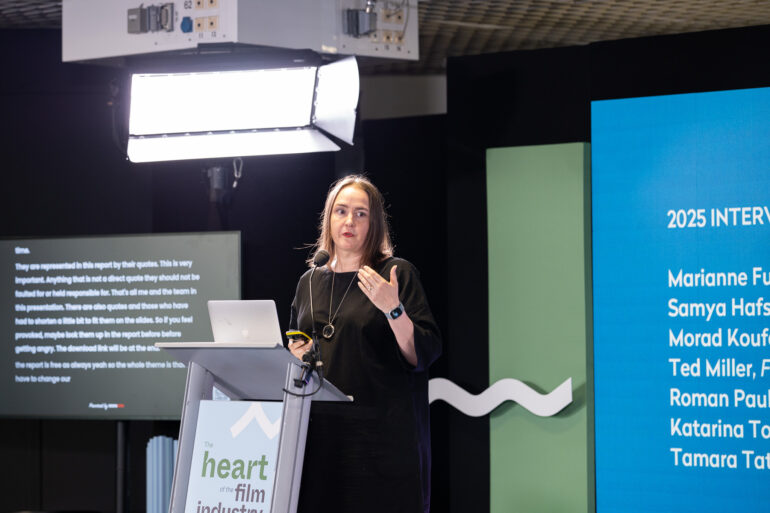Written by: Davide Abbatescianni
20.05.25
The 2025 Nostradamus Report urges structural adaptability, global solidarity, and artistic courage amid deepening crises.
In its 12th edition, unveiled on May 19 at Cannes Next during this year’s Marché du Film (13-21 May), the Nostradamus Report authored by media analyst Johanna Koljonen and presented by the Göteborg Film Festival delivers a sobering yet empowering message: The film industry must cease resisting the gravity of real-world crises and instead develop resilient systems capable of enduring their consequences. Framed by the urgency of ongoing atrocities and political instability, the report calls on professionals to recognise their power and responsibility — not merely to survive, but to sustain relevance, advocate for artistic freedom, and create models of practice that can weather the chaos.
The session opened with remarks from Koljonen, following introductory words by Josef Kullengård and Sten-Kristian Saluveer. Speaking with raw emotional intensity, she acknowledged the moral weight of global inaction, specifically invoking the horrors of Gaza. Her statement — “our inability to stop these atrocities is a huge failure with no excuses” — set a stark ethical frame. How, she asked, can cinema continue to reflect the human experience when the audience is increasingly hardened to suffering? How do we balance discourse on independent distribution when civilians are being murdered? “We’re going to leave with this paradox,” she said, referencing the challenge of forecasting in an irrational world shaped by political extremism and eroded governance. Despite this, she urged those working in film not to retreat, but to take heart in the meaningfulness of their labour. “We’re not working in the mines — we’re doing fine,” she remarked, offering a moment of perspective amid the weight of her concerns.
She stressed that realism, rather than despair, should guide the industry’s next moves. Resilience, as she described it, must be built across mental, financial, and structural dimensions. “We need a totally new level of adaptability,” Koljonen said, cautioning that the mismatch between production volumes and systemic capacity can no longer be ignored. Still, this is no time for resignation. Each individual, she insisted, has a role to play in transforming the industry into something more agile, more ethical, and more relevant. With that, she introduced the 2025 report, offering detailed reflections on the complex terrain the audiovisual sector must now navigate.
The seven industry experts interviewed for the 2025 edition of the study are Marianne Furevold-Boland, Head of Drama at NRK; Samya Hafsaoui, screenwriter and audience designer; Morad Koufane, Head of International and Young Adult Drama at France Télévisions; Ted Miller, agent and founder of Triangle Management Partners; Roman Paul, producer at Razor Film; Tamara Tatishvili, Head of the Hubert Bals Fund at the International Film Festival Rotterdam; and Katarina Tomkova, producer at Kaleidoscope and Punkchart films.
The report begins by identifying a critical shift in mindset — from resisting reality to building a kind of resistance that is strategic, structural, and collective. The idea of “resilient resistance” replaces outdated notions of recovery or business-as-usual forecasting. In today’s world of systemic instability, it’s not enough to anticipate change; we must prepare for disruption with frameworks that are responsive rather than reactive. Whether the disruption comes in the form of armed conflict, economic collapse, or environmental crisis, the survival of the screen industries depends on their ability to integrate flexibility into their core practices.
Building on this, the report underscores the unequal distribution of pain and precarity across global regions. The industry may be globally interconnected, but the lived experience of its professionals is deeply local. Inflation, repression, censorship, and displacement manifest differently from one territory to the next, yet the necessity for mutual understanding and international solidarity is universal. True resilience, Koljonen notes, requires not only adaptability, but empathy — an ability to see beyond one's borders and contribute to systems of support that transcend national boundaries.
In many parts of the world, democratic backsliding is no longer an impending threat, but a present-day condition. This erosion of liberal democratic norms, the report argues, has enormous implications for storytelling. As political environments grow more restrictive, every narrative becomes politicised by default. This means filmmakers and producers must remain vigilant — not only in protecting editorial independence, but in resisting self-censorship and the subtle encroachment of authoritarian ideologies. The report frames storytelling as a political act, whether intentional or not, and calls for a collective refusal to normalise the narrowing of cultural space.
As Hollywood’s symbolic dominance fades, a new creative era is emerging. While the American studio system once defined the global language of cinema, the report suggests that its cultural authority is now in decline. This power vacuum opens up possibilities for new voices, new aesthetics, and new hubs of creative leadership. Rather than viewing this as a loss, Koljonen sees opportunity: the chance for filmmakers outside the traditional epicentres to shape global tastes and expand audience expectations. The next three to five years, she predicts, will see the rise of world cinema not as a niche, but as a new mainstream — diverse in origin, wide in appeal, and no longer tethered to Hollywood’s gravitational pull.
Amid political pressure and shrinking public funds, the report also urges the industry to rethink its relationship with domestic audiences. Advocacy for film is no longer a side task — it is central to survival. This includes defending the cultural and social value of cinema, not just its economic footprint. For film to retain public support, it must demonstrate its relevance beyond the screen. Koljonen stresses that legitimacy is key: Without reconnecting with local viewers, especially in politically sensitive climates, the industry risks being sidelined in both funding and discourse. Advocacy, in this sense, is not additional labour — it is the labour.
Another core theme is the urgent need to redesign development and distribution practices. The models in place today were built for a market landscape that no longer exists. Development strategies must now embrace cross-disciplinary, iterative approaches that take into account both the creative process and real-world constraints. Likewise, distribution must evolve beyond traditional windows and formats. Koljonen points to ongoing experiments in collective visibility and new release strategies that show promise — not just in reaching audiences, but in engaging them meaningfully. These shifts are not optional tweaks, but necessary overhauls if the industry is to remain viable.
Finally, the report tempers its analysis with optimism, celebrating the fact that many films and series are succeeding — even within this difficult landscape. Lower production thresholds, enabled by more accessible technologies and decentralised workflows, are helping a greater diversity of voices to emerge. This success is not merely anecdotal: It represents proof that resilience and innovation are already at work in pockets of the industry. Koljonen calls this abundance of good work a source of “hope, inspiration, and a new generation of storytellers”, reminding her audience that there is still plenty in the current ecosystem that does work. The task ahead is to build upon these examples, not romanticise the past.
After the presentation, Koljonen was joined on stage by Paul and Tomkova. The conversation, grounded yet aspirational, circled around the need for courage — not only in standing firm against external threats, but in supporting each other through internal change. Both guests agreed that empowerment and collective bravery are indispensable. Koljonen suggested a shift in vocabulary: Perhaps instead of “difficult projects” or “challenging markets”, we should begin to speak of “wonderful challenges” and “hopeful struggles”. This reframing, she implied, could lead to a deeper transformation — one that is not only professional, but profoundly personal.
To date, the Nostradamus Report continues to serve as a guiding compass for the industry in transition. Supported by Creative Europe MEDIA, BoostHBG, Kulturakademin, Lindholmen Science Park, Region Västra Götaland, and the Nordisk Film & TV Fond, the initiative remains a critical space for foresight, analysis, and above all, courage. In times of acute uncertainty, it reminds us that storytelling is not a passive act, but a political one — and that resilience is not just about survival, but about purpose.
For the full report: CLICK HERE.


